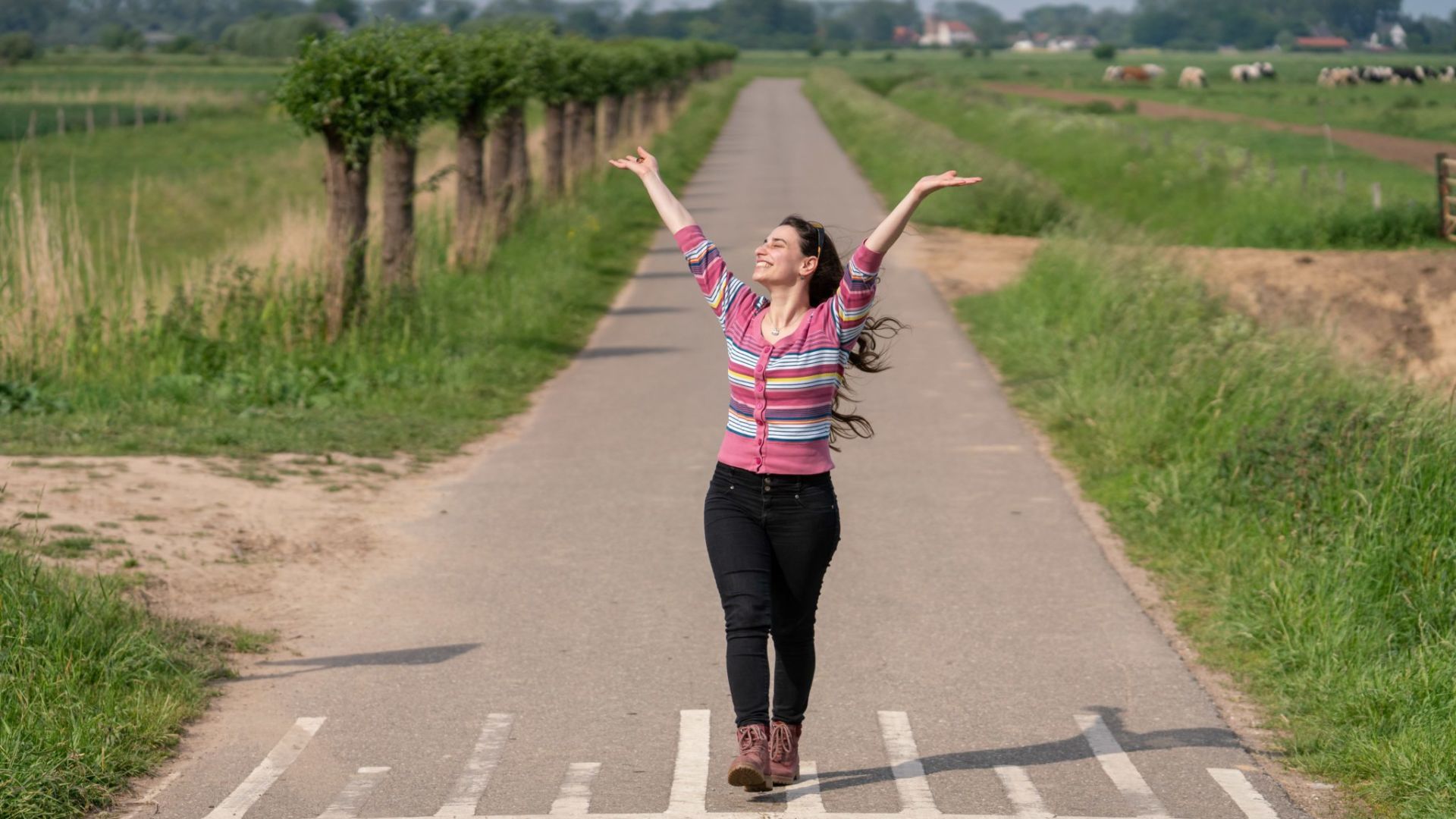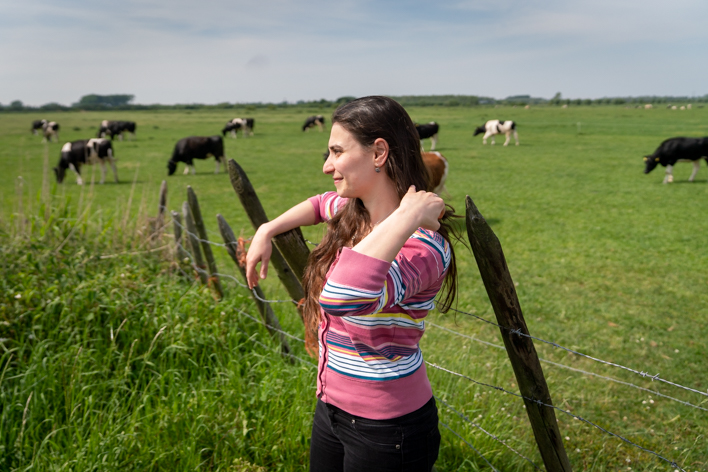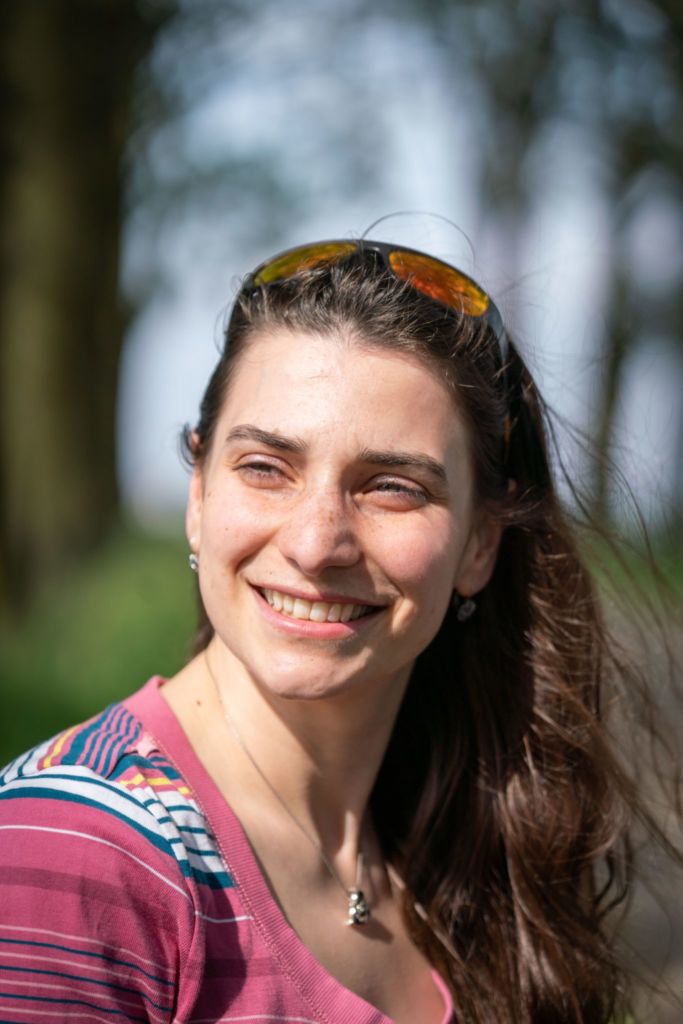Lilas Fahham knows how to make a new start
-
 © Erik van 't Hullenaar
© Erik van 't Hullenaar
Lilas Fahham (29) never thought she’d come to Europe as a refugee. She now lives in a small apartment in Groningen, and works at the Nijmegen Campus. She investigates the relationship between mental health and labour market participation among Syrians in the Netherlands.
Her mother in Aleppo now also knows the Dutch words ‘gemeente’ (municipality) and ‘belastingkantoor’ (tax office). They call each other every day on WhatsApp, sometimes twice a day, if the Internet in Syria allows it. When Lilas Fahham talks about her work, she mixes Arabic and Dutch words. ‘My mother and I are very close. She always knows what I’m doing and how I feel.’
The last time they saw each other in person was in the summer of 2015, in Turkey. Fahham travelled from the Netherlands, her mother from Aleppo, where she works as a paediatrician. ‘Of course I’d love her to be here with me. But it’s not that easy for her to leave. The worst of the war is over now, she and my stepdad still have their house, and they’re used to a new way of life.’ Fahham pauses for a moment, then adds: ‘It would also be harder for them to get a residence permit here.’
‘You live your life, you do your best, you study. Then one day, war breaks out in your country.’
Lilas Fahham talks fast. Her fingers click on the table in one of the glass rooms in the Elinor Ostrom building. Her long black hair is loose. She alternates between Dutch and English. After all, English is the language of academia. And it’s familiar to her. She grew up in West England, where her parents both took further specialisations in Medicine. She was six when the family returned to Syria.
Jordan
As a teenager, and later a student, she never for a moment imagined she would one day have to apply for asylum somewhere. ‘You live your life, you do your best, you study. Then one day, war breaks out in your country. No one expected it. I never imagined I’d come to Europe in such circumstances. As a student perhaps, or a tourist, but not as a refugee.’
She knows now that life can capsize from one moment to the next like a sailing boat in a strong gust of wind. But it took her a long time to accept that there was no going back. War in Syria? Just wait a little, tomorrow it will be over. Or else the day after.
She was working on her Master’s programme in Jordan when the war broke out. She had completed a Bachelor’s on Nutrition at the University of Kalamoon, in South West Syria. ‘I was lucky not to be in the country and to have something to do. I thought: by the time I complete my Master’s programme in two years, it will be over for sure.’ She lived for a while in Lebanon, where her father had fled with her step-mother. Then the refugee flow began to move. Fahham let herself be carried by it: ‘I just came along.’
Waste
In December 2014 she arrived at the asylum centre in Delfzijl. Amazed about how neat and tidy everything was. ‘I saw how clean the roads were, I saw people throwing their trash into the bin, and even separating waste. It made me so happy: paper here, plastic here, residual waste there. I loved that! In Syria, you just throw everything on one heap, if you bother to throw waste into a bin at all, and not just on the street. Drivers sometimes throw thrash out of the window; you don’t get fined for it anyway. I’ve always found it so annoying!’
Few Syrians have managed to get paid work in the Netherlands so far: only 12%, according to recent data from the Netherlands Institute for Social Research. Most Syrians experience psychological problems: they’re nervous, depressed, and sad.
As of 1 March, Fahham works for the Nijmegen School of Management, where she investigates the relationship between mental health and labour market participation among Syrians in the Netherlands. She interviews experts on how to best help this group overcome the obstacles they face. Her knowledge of the language and culture will come in useful. ‘I can offer an insider’s perspective. For example, in our culture it’s not done to talk about your feelings, especially to people outside your family.’
‘You’re at the other end of the world in eight hours’
She wants to continue to work in academia. Especially if her research serves a clear social purpose. And it doesn’t have to focus exclusively on Syrian migrants. ‘I’m really interested in studying new migration groups. How do they cope with their new environment? How do they fare in terms of health and social participation? The world is getting smaller. It used to take people years to travel from one place to another. Now you take a plane, and you’re at the other end of the world in eight hours.’
And then, one day, there you are, at the other end of the world. You need time to accept the facts, she now knows. ‘When the war began, many of us stopped what we were doing. We thought: when this is over, we’ll go back to our lives.’ In the meantime she followed a Master’s programme on Population Studies at the University of Groningen. ‘I was only half alive. I didn’t go out, I spent all my time studying. I was constantly postponing things. Once I complete my Master’s, I thought, my new life will begin. Until I finally understood that it made no sense to wait. I had to get on with my life. I’d already lived in the Netherlands for two years by then.’
Cows
She lives with her cats, Sami and Marley, in a small apartment in Groningen. Her brother moved to Sweden, but her father lives close by. He ended up in Hoogeveen, with his wife and their daughter. ‘I visit them on a regular basis for a good Syrian meal. He picks me up from the train and he and my step-mother cook for me. It’s lovely!’

On her way back to Groningen, she enjoys the view from the train. ‘I love all the green and the fact that it’s so flat. You can really see the horizon.’ And all those little farms with the funny cows. ‘In Syria, we call them ‘spoiled cows’. We have a special kind of butter, which is advertised under the slogan ‘This butter comes from Dutch cows’, and the advertisement shows cows lazing about in the grass or playing in the meadows. So when I first came here I wanted to see those cows with my own eyes.’ She laughs: ‘And it really is like that!’
Don’t you find it a beautiful word, she asks as she crosses the halls of the Elinor Ostrom building. ‘Rus-tig’ (‘Calm’). She repeats it one more time. ‘In Arabic or English, it’s just a word, but in Dutch you can feel the calm in the word.’ A word that has special meaning for her, as her early days in the Netherlands were far from calm. ‘I was constantly stressed. I felt like I had to do everything perfectly. I still remember standing at the cash register in the supermarket. I’d paid, but I still had to pack up my groceries. I was hurrying, because I didn’t want the people behind me to have to wait. But the clients in the queue looked at me with an expression that seemed to say ‘take your time’. And the cashier said: “Relax, it’s OK.”‘
‘I became more relaxed in the Netherlands.’
Maybe it’s because she’s a refugee or a foreigner that she feels the need to prove herself so much. But she’s also had to shake off the Syrian norm that says you should never inconvenience anybody. ‘It’s an additional stress factor, also for me. You’re always afraid of stepping on someone’s toes. It was only in the Netherlands that I learned to let it go.’ She thinks for a moment, then adds: ‘I became more relaxed in the Netherlands.’
Building a new life and going along with the mainstream also means finding a job. Which is not easy when nobody knows what your diploma and work experience are worth. For Syrians, looking for a job in the Netherlands is nothing like looking for a job in their country of origin, explains Fahham. ‘In Syria, they know the language, they understand how the labour market works, they know people, and they have the diplomas everyone works with.’
Networking
You have to work hard for it, as she knows from experience. ‘Networking, talking to people, showing them what you’ve got to offer.’ The foundation for Refugee Students (UAF) advised her to attend a Career Event. There she met people who brought her into contact with the GGD Groningen (Municipal Health Authority), who created a traineeship position for her. She worked for them for six months as a junior researcher in Epidemiology. Via her new network she found out about the ‘Refugees in academia’ pilot. She now has a one-year contract at the Nijmegen School of Management. She’s happy about it, and hopes it will lead to a PhD position.
She scrolls to a photograph of Sami and Marley, two black and white patches on the sofa. She’s always had cats. When she left for Jordan to study, she found a nice lady who agreed to take care of her cat. She never saw the little animal again. She doesn’t dare to ask. How can she ask about her cat when this woman’s children may no longer be alive?




